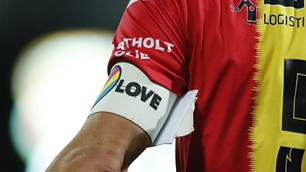FOOTBALL'S rule-makers today shut the door on goal-line technology indefinitely and with perfect timing the decision was swiftly followed by a legitimate goal being ruled out during an FA Cup quarter-final.
The International FA Board (IFAB) meeting in Zurich voted against continuing any further experiments with goal-line technology and effectively ended any chance of video replays coming into the game.
Opponents of technology argued that the human element of football should remain - mistakes and all.
Within minutes of the decision, Birmingham had a goal ruled out at Portsmouth when officials failed to spot David James had scooped the ball out after Liam Ridgewell's header had crossed the line.
The FA and Scottish FA had both voted in favour of technology but were defeated by six votes to two - FIFA's four votes plus those of the Welsh and Irish FAs.
FIFA general secretary Jerome Valcke said: "The door is closed. The decision was not to go ahead with technology at all."
The IFAB will decide in May whether to pursue the system of having an extra two officials behind each goal-line.
FA chief executive Ian Watmore had been in favour of goal-line technology and said: "In the end it came down to a difference of opinion about whether you believe the future of football involves technology or not.
"But some of the arguments were very powerful and persuasive and we have to accept them.
"The credibility of football is always improved if you get the critical decisions right. I would have liked to try it out in the real game to see whether it is good or not."
Goal-line technology had come back on the agenda following pressure on FIFA to look at other systems in the wake of Thierry Henry's handball in the World Cup play-off for France against the Republic of Ireland.
Two systems had been developed by Hawk-Eye and German firm Cairos but there were also fears that goal-line technology would be a 'trojan horse' to eventually allow full video replays into the game.
Valcke added: "Technology should not enter into the game. It was a clear, clear statement made by the majority of the IFAB.
"The main part of the game should be humans - players and referees.
"Whatever are the mistakes - and yes there are mistakes - people will review the match and discuss what happened but there was a clear statement that technology should not enter in the game.
"If we start with goal-line technology then any part of the game and pitch will be a potential space where you could put in place technology to see if the ball was in or out, whether it was a penalty and then you end up with video replays."
Jonathan Ford, chief executive of the Football Association of Wales, agreed with FIFA saying: "The human element of the game is the critical element of it.
"The debate they had with the goal in the 1966 final - that's still being talked about in pubs and that's the beauty of the game and keeping the game alive.
"I was worried that you would end up with a stop-start situation where you review all decisions and I don't see that as part of the game."
A decision on whether to bring in UEFA president Michel Platini's proposal for two extra assistant referees behind each goal-line will be taken on May 18 after the current experiment in the Europa League has finished.
The IFAB will also decide then on whether to change the rules so that a player who concedes a penalty is not automatically sent off if he also denies an obvious goalscoring opportunity.
(reopens)
Oliver Braun, marketing manager of Adidas-owned firm Cairos, criticised the decision.
Braun said: "They decide what's best for football. All the fans, referees, clubs, players and managers they say something different, but IFAB have the power to do that and we have to live with it.
"It's frustrating for us because we have deveoloped this system over so many years. IFAB encouraged us to develop the system. They set up some criteria and said if they were met they would go with the technology. For them to come back and say in principle we don't want to use any technology that's frustrating.
"If they said that before it would have saved a lot of time, effort and money.
"The solution to these incidents is here - it's not an issue that the technology isn't working. The technology is working, but they don't want to use it."
Opponents of technology argued that the human element of football should remain - mistakes and all.
Within minutes of the decision, Birmingham had a goal ruled out at Portsmouth when officials failed to spot David James had scooped the ball out after Liam Ridgewell's header had crossed the line.
The FA and Scottish FA had both voted in favour of technology but were defeated by six votes to two - FIFA's four votes plus those of the Welsh and Irish FAs.
FIFA general secretary Jerome Valcke said: "The door is closed. The decision was not to go ahead with technology at all."
The IFAB will decide in May whether to pursue the system of having an extra two officials behind each goal-line.
FA chief executive Ian Watmore had been in favour of goal-line technology and said: "In the end it came down to a difference of opinion about whether you believe the future of football involves technology or not.
"But some of the arguments were very powerful and persuasive and we have to accept them.
"The credibility of football is always improved if you get the critical decisions right. I would have liked to try it out in the real game to see whether it is good or not."
Goal-line technology had come back on the agenda following pressure on FIFA to look at other systems in the wake of Thierry Henry's handball in the World Cup play-off for France against the Republic of Ireland.
Two systems had been developed by Hawk-Eye and German firm Cairos but there were also fears that goal-line technology would be a 'trojan horse' to eventually allow full video replays into the game.
Valcke added: "Technology should not enter into the game. It was a clear, clear statement made by the majority of the IFAB.
"The main part of the game should be humans - players and referees.
"Whatever are the mistakes - and yes there are mistakes - people will review the match and discuss what happened but there was a clear statement that technology should not enter in the game.
"If we start with goal-line technology then any part of the game and pitch will be a potential space where you could put in place technology to see if the ball was in or out, whether it was a penalty and then you end up with video replays."
Jonathan Ford, chief executive of the Football Association of Wales, agreed with FIFA saying: "The human element of the game is the critical element of it.
"The debate they had with the goal in the 1966 final - that's still being talked about in pubs and that's the beauty of the game and keeping the game alive.
"I was worried that you would end up with a stop-start situation where you review all decisions and I don't see that as part of the game."
A decision on whether to bring in UEFA president Michel Platini's proposal for two extra assistant referees behind each goal-line will be taken on May 18 after the current experiment in the Europa League has finished.
The IFAB will also decide then on whether to change the rules so that a player who concedes a penalty is not automatically sent off if he also denies an obvious goalscoring opportunity.
(reopens)
Oliver Braun, marketing manager of Adidas-owned firm Cairos, criticised the decision.
Braun said: "They decide what's best for football. All the fans, referees, clubs, players and managers they say something different, but IFAB have the power to do that and we have to live with it.
"It's frustrating for us because we have deveoloped this system over so many years. IFAB encouraged us to develop the system. They set up some criteria and said if they were met they would go with the technology. For them to come back and say in principle we don't want to use any technology that's frustrating.
"If they said that before it would have saved a lot of time, effort and money.
"The solution to these incidents is here - it's not an issue that the technology isn't working. The technology is working, but they don't want to use it."
Copyright (c) Press Association
Related Articles

Morocco blazing a trail for Arab women's football participation

FIFA blasted for OneLove armband threat













